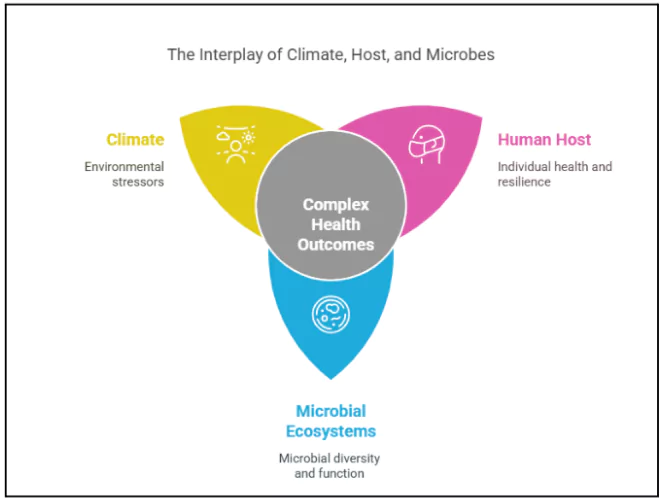Recent research published in The Lancet Planetary highlights how climate-induced disruptions in food quality and environment are altering gut microbiota, introducing a new path to illness.
Key Findings of the Study
- Food and Gut Microbiota: The research emphasizes that changes in yield and nutritional quality of food due to climate change can disrupt gut microbial balance.
| PW OnlyIAS ExtraEdge
About Gut Bacteria
- Gut bacteria are microorganisms that live in the digestive tracts and play a vital role in digestion, immunity, and overall health.
- Common examples of Gut bacteria include Escherichia coli, Lactobacillus, Bifidobacterium, Clostridium, and Bacteroides, which help break down food, synthesize vitamins, and protect against harmful pathogens
|
- Micronutrient Loss in Crops: Elevated carbon dioxide levels reduce key nutrients such as zinc, iron, and protein in staple crops like wheat, rice, and maize, aggravating gut microbiota imbalances.
- Harmful Microbial Strains: Diminished microbial diversity caused by undernutrition and poor-quality food may lead to an increase in malnutrition-associated and disease-promoting microbial strains.
- Vulnerable Populations: Low- and middle-income countries (LMICs) and indigenous communities are particularly susceptible due to greater exposure to climate stressors and dependence on local food systems.
- Multiple Environmental Stressors at Play:In addition to food quality, environmental changes in water, soil, and climate-driven heat also influence microbial populations.
Impact on Human Health and Disease Patterns
- Gut Dysbiosis: Disruption of gut microbiota (dysbiosis) is linked with conditions like eczema, type 1 and 2 diabetes, inflammatory bowel disease, and even neurological disorders.
- Heat-Linked Disease: A study from IIPH Gandhinagar notes that heat leads to more foodborne and waterborne illnesses, further influencing gut health negatively.
- Loss of Microbial Interdependence: It leads to loss of cooperation between ‘normal’ microbes, impacting metabolism and immunity.
- Unique Microbiota Responses: Individuals have distinct gut microbial compositions; hence, climate-driven impacts and interventions like probiotics may have different outcomes across people.
About the Climate-Health Nexus

- Triangular Relationship: The relationship between climate, the human host, and microbial ecosystems is complex and interdependent, with multiple simultaneous stressors like heat, pollution, and food insecurity.
- Understudied Connection: While the human health impacts of climate change are widely researched, its effect on gut microbiota remains underexplored due to siloed scientific approaches.
- Data and Technology Advancements: Tools such as metagenomics and databases like GutBugBD are aiding in understanding microbial responses and may guide future therapeutic interventions.
Response Needed to Address the Challenge
- Need for Collaborative Research: Experts stress the importance of interdisciplinary research combining climate science, microbiology, nutrition, and public health to address this emerging crisis.
- Funding and Infrastructure Gaps: A lack of dedicated funding and international research collaborations remains a major obstacle in fully understanding and mitigating the gut microbiota impacts of climate change.
- Personalized and Local Solutions: Given the uniqueness of individual microbiomes and regional vulnerabilities, localized dietary, healthcare, and policy interventions will be crucial in addressing this issue effectively.
![]() 8 May 2025
8 May 2025

